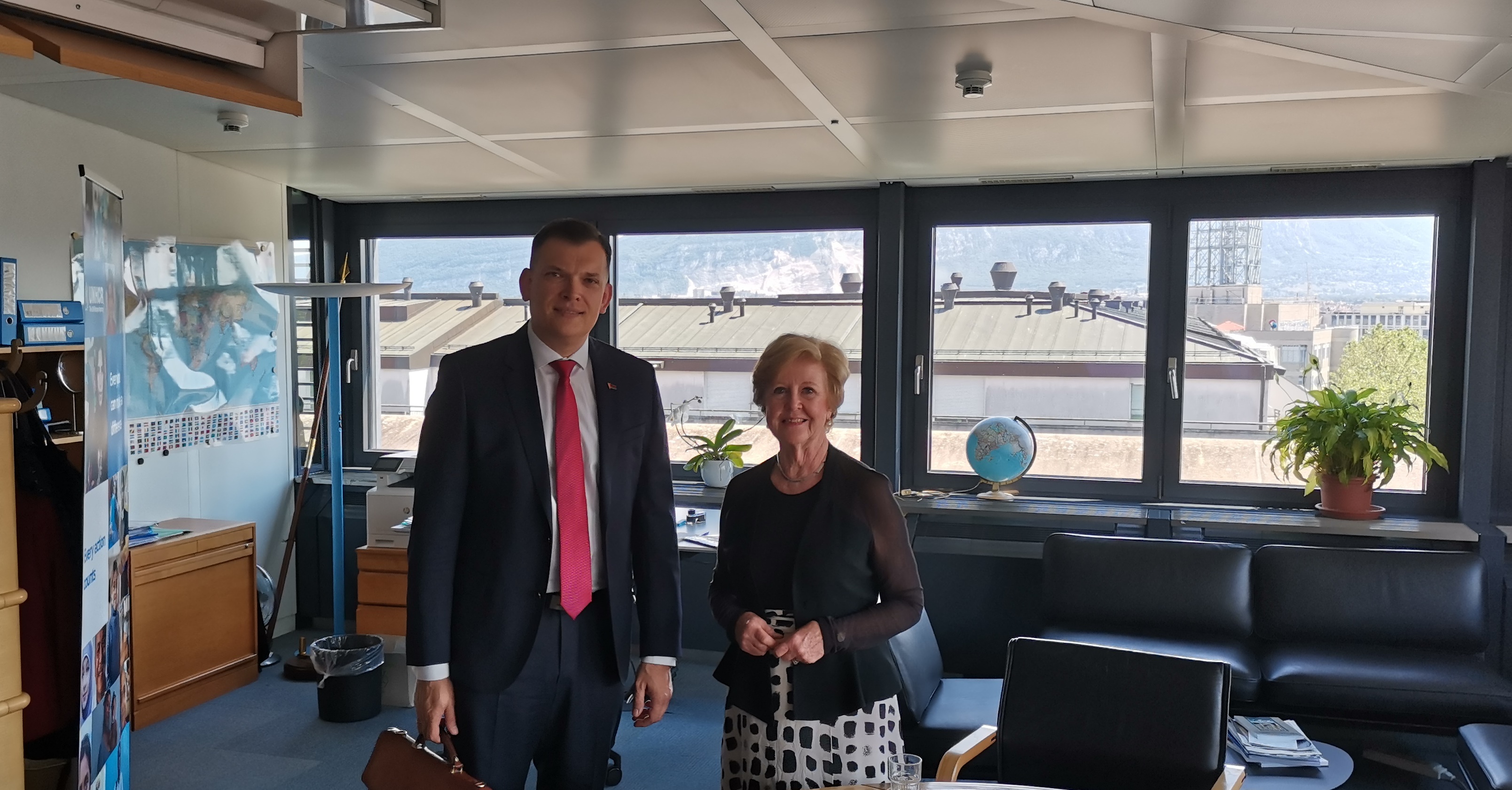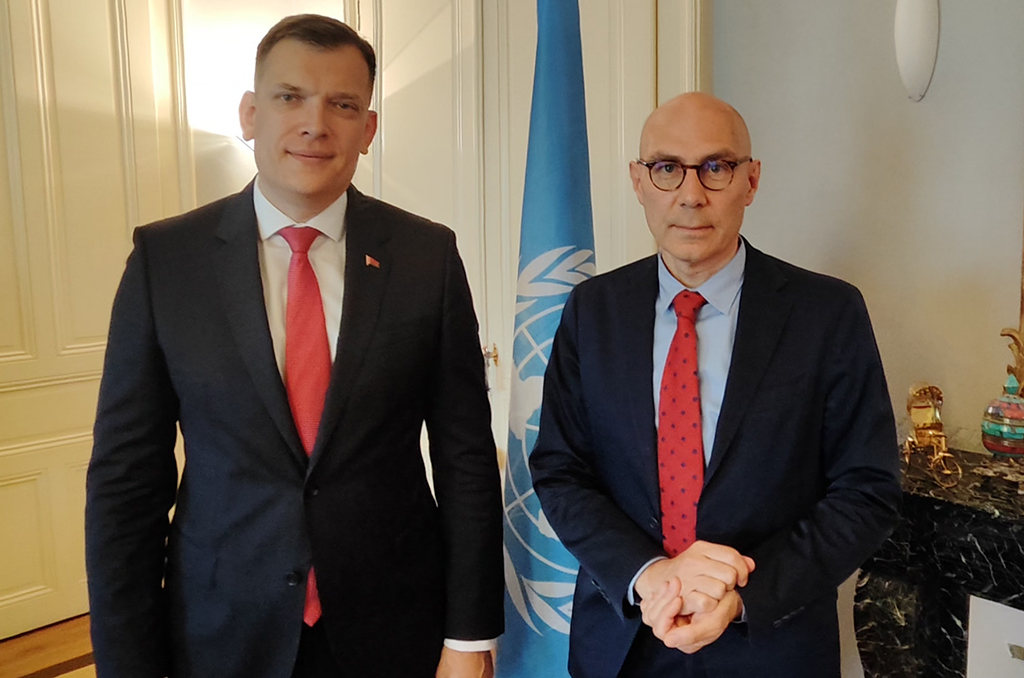Deputy Minister of Foreign Affairs of Belarus Y.Ambrazevich takes part in the work of the Belarusian delegation at the 111th session of the International Labor Conference in Geneva
20.06.2023On June 12-13, 2023 the Deputy Minister of Foreign Affairs of the Republic of Belarus, Yuri Ambrazevich, takes part in the work of the Belarusian delegation at the 111th session of the International Labor Conference in Geneva.
During his visit to Geneva, Y.Ambrazevich met with the Vice-President of the International Committee of the Red Cross (ICRC), Gilles Carbonnier.

The parties stressed the constructive nature of cooperation between the Government of Belarus and the ICRC, noted the existing effective instruments for bilateral cooperation, including the annual cooperation plan, the activities of the ICRC Office in Minsk, regular trustful contacts between the two parties at the level of the ICRC Regional Office in Moscow and the Organization's headquarters in Geneva.
The interlocutors discussed the current state of international relations and the development of their military and humanitarian components in the world, in Europe and, more specifically, on the borders of Belarus.
They stressed the readiness of the parties to maintain possible operational support for each other in case of emergency humanitarian situations.
Y.Ambrazevich welcomed the activities of the ICRC on rendering its assistance to the Belarusian Red Cross, including financial support, aimed, among other things, at strengthening the efforts of the Belarusian government to meet the basic needs of refugees and migrants from Ukraine.
Deputy Foreign Minister held a meeting with the United Nation High Commissioner of Refugees’ (UNHCR) Assistant for Protection, Gillian Triggs.

The interlocutors discussed the current cooperation between the Belarusian Government and the UNHCR on the implementation of the tasks of ensuring a decent situation for foreign refugees and stateless persons in the territory of Belarus.
The increased UNHCR’s assistance to the Government of Belarus in solving the problems caused by the growing number of migrants from Ukraine was noted.
The Deputy Foreign Minister drew attention of the High Commissioner’s Assistant to the Belarusian side’s concern in connection with the escalation in the information field by the governments of Poland and Lithuania unfounded allegations against the government of Belarus of purposefully using the topic of illegal migration against the European Union.
Y.Ambrazevich recalled the effective cooperation that the Government of Belarus and the UNHCR demonstrated during the second half of 2021 and beyond in resolving the crisis with illegal migrants at the border of Belarus and the EU member states. He underlined the fact that since the most acute phase of the crisis, despite the readiness of the Belarusian government, Poland, Lithuania and Latvia still refuse to cooperate with Belarus on countering and managing illegal migration. He stressed that the refusal of international cooperation on the common border made these countries fully responsible for the growth of organized crime associated with the illegal crossing of the Belarusian border by foreigners in the direction to the European Union and for the suffering and death of refugees linked with this traffic.
The Deputy Minister expressed his conviction that UNHCR would maintain an impartial and depoliticized approach to fulfill its mandate on Belarus’ borders with Poland, Lithuania and Latvia, and also called on the Assistant High Commissioner to play a more active role in restoring international cooperation on problematic issues along the borders of Belarus with European Union member states.
Y.Ambrazevich held a critical dialogue with the United Nations High Commissioner for Human Rights, Volker Turk.

During the conversation, the Belarusian diplomat expressed deep concern about the politicization and double standards in the field of human rights, the use of the UN system and human rights topic in the work of the UN for selective accusations of individual countries contrary to the UN principles of sovereignty of states and non-interference in their internal affairs.
He pointed out the absence of common objective standards for the implementation of human rights. In support of this position, he handed over to the High Commissioner an advance copy of the Report of the Ministry of Foreign Affairs of the Republic of Belarus on human rights violations in certain countries. He stressed that the Report fully illustrates that the human rights situation in Belarus against the backdrop of most countries of the world, including those that criticize Belarus to exert external pressure on the political leadership of the country, does not deserve the current close attention within the UN.
Y.Ambrazevich also expressed disappointment with the role and activities that the OHCHR and the High Commissioner personally are obliged to carry out instead of uniting efforts, ensuring cooperation between states and assisting states – the main tasks for which the UN was created.
The Belarusian diplomat emphasized the interest of the Government of Belarus in cooperation with the UN, including OHCHR, on issues of practical benefit to the people and the state, in order to promote national efforts on improving legislation and law enforcement practice.
He expressed confidence that, within the framework of the OHCHR’s mandate, there were a potential for cooperation in the implementation of state policy in the country under the National Action Plan to improve the situation of children and protect their rights for 2022-2026, the Action Plan for the implementation of the law on the rights of persons with disabilities and their social rehabilitation, the National Plan for ensuring gender equality in the Republic of Belarus for 2021-2025. It was stressed that unlike the OHCHR, the cooperation of the Belarusian government with a number of other UN structures were meaningful and effective.
The leadership of the OHCHR was urged to stop serving “big politics”, but to address the specific aspirations of common Belarusian people and to contribute to the sustainable development of the country in accordance with the tasks set by the national government, and not by foreign politicians.